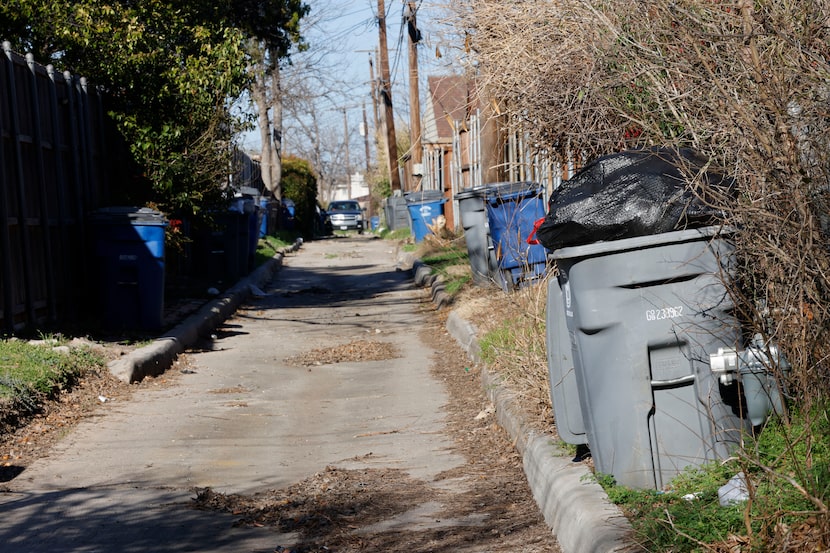Top Stories
Dallas Urged to Outsource Trash Collection Amid Budget Crisis

UPDATE: Dallas officials are facing mounting pressure to outsource trash collection as a coalition of residents argues the city’s proposed plan to eliminate alley pickup would harm tens of thousands of residents. The Keep Alley Trash Neighborhood Coalition is advocating for a more efficient and cost-effective solution, citing significant savings and improved service quality.
Residents are worried that the elimination of alley trash pickup would force them to haul bins to the street, impacting vulnerable populations, including the elderly and those with disabilities. This push comes amid ongoing budgetary challenges for the city, raising urgent concerns about the operational viability of public sanitation services.
Coalition leaders James Collet and Jeff Helfrich have proposed that the city explore outsourcing trash collection to private operators, a model already successfully implemented in cities like Houston, Fort Worth, and Charlotte. This strategy could not only alleviate financial pressures but also enhance service quality, ensuring equitable access for all Dallas residents.
A recent meeting with Dallas City Manager Kimberly Bizor Tolbert indicated that outsourcing is indeed on the table for consideration. While no formal decision has been made, city staff members expressed interest in the coalition’s suggestions. This development marks a critical moment for the city, which serves approximately 95,000 households through its current sanitation system.
The coalition’s research highlights the potential benefits of outsourcing, including estimated savings of up to $6 million annually, as seen in Toledo, Ohio. There, outsourcing led to a significant reduction in service complaints—from hundreds per month to just a handful. Officials assert that private firms often provide better training and safer working conditions for sanitation workers.
Current safety data supports this claim: private companies like Republic Services and Waste Management report lower OSHA injury rates—2.8 and 3.08, respectively—compared to the industry average of 4.4. This raises a vital question: should Dallas prioritize safety and efficiency by partnering with specialized firms instead of relying on its own potentially outdated systems?
The coalition is urging the city to conduct a comprehensive analysis before making any drastic changes. This analysis should include:
– Cost comparisons, encompassing both operational and capital expenses.
– Safety records from city and private haulers.
– Customer satisfaction metrics and service quality benchmarks.
– Equity assessments focusing on impacts to vulnerable populations.
Collet and Helfrich emphasize that maintaining alley service through outsourcing is not merely a matter of convenience—it is a matter of equity. They argue that forcing residents to drag heavy bins to the street disproportionately affects those with limited mobility.
The coalition believes that the city’s long-term strategy should not be limited to eliminating alley service but should instead consider innovative models that incorporate private competition. As Dallas strives to balance fiscal responsibility with resident well-being, the potential for improved operational efficiency through outsourcing remains a key point of discussion.
Dallas is known for its innovation and community spirit. Embracing outsourcing as a strategic solution could help preserve essential services while addressing budgetary constraints. The coalition’s call for action is clear: before dismantling a system that serves tens of thousands, Dallas must explore all viable options to enhance service delivery and ensure fairness for all residents.
Stay tuned for further updates as the city deliberates on this crucial issue that impacts everyday life for many in the Dallas community.
-

 Science3 weeks ago
Science3 weeks agoInterstellar Object 3I/ATLAS Emits Unique Metal Alloy, Says Scientist
-

 Science3 weeks ago
Science3 weeks agoResearchers Achieve Fastest Genome Sequencing in Under Four Hours
-

 Politics4 weeks ago
Politics4 weeks agoAfghan Refugee Detained by ICE After Asylum Hearing in New York
-

 Business3 weeks ago
Business3 weeks agoIconic Sand Dollar Social Club Listed for $3 Million in Folly Beach
-

 Health4 weeks ago
Health4 weeks agoPeptilogics Secures $78 Million to Combat Prosthetic Joint Infections
-

 Lifestyle4 weeks ago
Lifestyle4 weeks agoJump for Good: San Clemente Pier Fundraiser Allows Legal Leaps
-

 Business4 weeks ago
Business4 weeks agoMcEwen Inc. Secures Tartan Lake Gold Mine Through Acquisition
-

 Science4 weeks ago
Science4 weeks agoMars Observed: Detailed Imaging Reveals Dust Avalanche Dynamics
-

 Health3 weeks ago
Health3 weeks agoResearcher Uncovers Zika Virus Pathway to Placenta Using Nanotubes
-

 World4 weeks ago
World4 weeks agoUS Passport Ranks Drop Out of Top 10 for First Time Ever
-

 Entertainment4 weeks ago
Entertainment4 weeks agoJennifer Lopez Addresses A-Rod Split in Candid Interview
-

 Business4 weeks ago
Business4 weeks agoSan Jose High-Rise Faces Foreclosure Over $182.5 Million Loan







